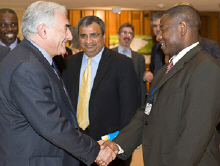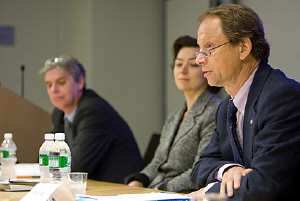The IMF and Civil Society

Dominique Strauss-Kahn greets Andrew Kumbatira of the Malawi Economic Justice Network at the reception for CSOs
Civil Society Engagement at the 2008 Spring Meetings
April 11, 2008
The 2008 Spring Meetings attracted strong civil society participation, with some 200 representatives from civil society organizations (CSOs) representing 30 countries.
The Spring Meetings once again offered space to CSOs to discuss a range of topics related to the work of the Fund and Bank. Over 200 representatives from 30 countries attended Spring Meetings events, centered on the Civil Society Policy Forum.
Room for Discussion
Through the Forum, the IMF and the World Bank provided space for CSOs to meet with staff and other meetings participants. From April 10-12, 26 policy dialogue sessions were organized by either the Bank, Fund, CSOs, or jointly. Most addressed issues related to low-income countries, including the economic outlook for sub-Saharan Africa; the impact of food and oil price inflation; the Bank's approach to consultations; private capital flow to low-income countries, anti-corruption efforts, and climate change.
The tone of the sessions depended on how controversial the topic was and who was leading the discussion. Most sessions were well attended by Southern CSO representatives, especially from sub-Saharan Africa. Those representatives said they appreciated the opportunity to have a conversation with IMF staff on issues that affect them personally.
Spring Meetings Briefing
The Forum kicked off with a welcome breakfast hosted by the Fund and Bank Civil Society Teams on April 10. The same day, EXR Director Masood Ahmed and his Bank counterpart, Marwan Muasher, briefed CSO participants on the key issues of the Spring Meetings. In the discussion a CSO representative wondered if the current IMF downsizing exercise was not the wrong step at this time of financial turmoil. Ahmed said that the current financial crisis calls for new staff expertise. However, this expertise differs from — and requires less staff time than — the work that is associated with declining IMF lending operations.
CSOs also asked about the Fund's approach to consultations, picking up on Muasher's remark that the Bank was reviewing its consultation framework. Ahmed said that consultations have helped the Fund to shape its polices — for example, the review of conditionality guidelines — and pointed to consultations on the upcoming review of the Policy Support Instrument (PSI).
Reception with the Managing Director
The briefing was followed by a reception for CSOs hosted by IMF Managing Director Dominique Strauss-Kahn and World Bank President Robert Zoellick. Andrew Kumbatira from the Malawi Economic Justice Network introduced the head of the institutions and moderated a short discussion. He said he hoped that the IMF was not reducing its already small presence in low-income countries as it moves to close some country offices. Strauss-Kahn, in his opening remarks, welcomed civil society participation and said that he hoped he would have more opportunities to discuss in greater depth the issues of mutual concern to the IMF and civil society. He stressed the current concern about food prices in many low-income countries.

Erich Vogt of the World Conservation Union chairs the IMF session on climate change with IMF staff Natalia Tamirisa and Michael Keen
Low-Income Countries, Climate Change and the Regional Outlook
The main IMF events organized for CSOs revolved around low-income countries, in particular sub-Saharan Africa. The IMF's recent work on climate change was also featured. Andrew Berg and Paulo Drummond of the IMF's African Department (AFR) presented the Regional Economic Outlook (REO) for sub-Saharan Africa and the IMF's assessment of the challenges posed in the region by the recent increases in oil and food prices. Tom Dorsey of the Policy Development and Review Department (PDR) and AFR's John Wakeman-Linn described the recent work on private capital flows to low-income countries, also featured in the REO. Private capital flows to sub-Saharan Africa have increased almost fivefold since 2000, and CSOs were keen to discuss the potential implications for the region and especially their own countries.
Also well attended was the session on the macroeconomic and fiscal consequences of climate change, moderated by Erich Vogt of the World Conservation Union. Michael Keen of the IMF Fiscal Affairs Department (FAD) and Natalia Tamirisa of the IMF Research Department presented the IMF's contribution to the debate on climate change, which was recently released in Chapter Four of the World Economic Outlook and a separate paper by FAD (Fiscal Implications of Climate Change).
Other Civil Society Events:
- The IMF and World Bank organized a one-day orientation session on the work of the IMF and World Bank. It was offered to all accredited CSOs after a similar event for sponsored CSOs and journalists at last year's Annual Meetings and requests to offer such a session to all groups attending the Meetings.
- Juan Zalduendo (PDR) participated in a session on structural conditionality, organized by EURODAD, the Bank Information Center (BIC), and the Bretton Woods Project (BWP). Other speakers were Ruben Lamdany (IMF Independent Evaluation Office), Lucy Hayes (EURODAD), and Peter Chowla (BWP). The session was moderated by Bhumika Muchhala (BIC).
- Philip Daniel (FAD) and other IMF staff participated in a session organized by the BIC and Global Witness (GW) on how to strengthen extractive industry revenue transparency in World Bank Group and IMF operations. The meeting, chaired by Heike Mainhardt-Gibbs (BIC) and Corinna Gilfillan (GW), was structured around a preliminary report by BIC and GW assessing implementation by the Bank and the Fund of their transparency requirements as evidenced by their publicly available documents. Clive Armstrong of the International Finance Corporation represented the World Bank Group.
- Roger Nord, AFR's Assistant Director and Tanzania mission chief, and David Robinson, IMF Resident Representative in Tanzania, participated in a session on the International Health Partnership convened by the WB and CSOs Oxfam and Treatment Action Group. They stressed the recent IMF policy to advise countries against the use of wage bill ceilings.
- In a session separate from the Forum, Patricia Alonso-Gamo (PDR) and colleagues met with a group of CSOs to solicit input on the upcoming PSI review.
